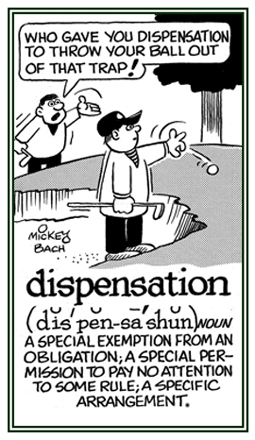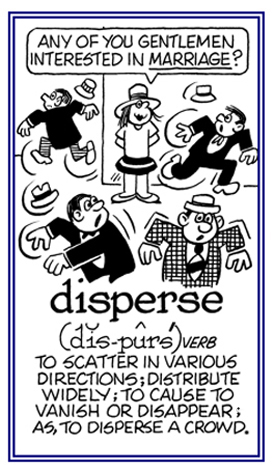dis-, di-, dif-
(Latin: separation, apart, asunder; removal, away, from; negation, deprivation, undoing, reversal, utterly, completely; in different directions)
The meaning of dis- varies with different words; dif-, assimilated form of dis- before f; di-, form of dis- before b, d, g, l, m, n, r, and v.
dispensate
1. Permission to break a law or an official promise that has been made: The defendant asked the court to grant him a dispensation from having to pay his divorced wife any additional money.
2. An action that provides something to people: The doctor provided a dispensation for Arnold to continue participating in the sports event after he had fallen and hurt his hand.

© ALL rights are reserved.
Go to this Word A Day Revisited Index
2. An action that provides something to people: The doctor provided a dispensation for Arnold to continue participating in the sports event after he had fallen and hurt his hand.

Go to this Word A Day Revisited Index
so you can see more of Mickey Bach's cartoons.
dispensatory
dispense, dispenses, dispensed, dispensing (verb forms)
dispenser
disperse (verb), disperses; dispersed; dispersing
1. To drive or send off in various directions; to scatter: The police tried to disperse the crowd of protesters.
2. To spread widely; to disseminate: The role of the university is to disperse knowledge.
3. To dispel; to cause to vanish: The wind is dispersing the fog.
4. To cause particles to separate uniformly throughout a solid, a liquid, or a gas: For the face cream Susan needed, the pharmacist suggested that it should have certain ingredients that are dispersed evenly for the best results of her skin.
5. To dissipate, to cause the disappearance of, to scatter, to dilute: After Michael added the sugar to his hot tea, he stirred it and the sugar dispersed evenly and was completely dissolved.

© ALL rights are reserved.
Go to this Word A Day Revisited Index
2. To spread widely; to disseminate: The role of the university is to disperse knowledge.
3. To dispel; to cause to vanish: The wind is dispersing the fog.
4. To cause particles to separate uniformly throughout a solid, a liquid, or a gas: For the face cream Susan needed, the pharmacist suggested that it should have certain ingredients that are dispersed evenly for the best results of her skin.
5. To dissipate, to cause the disappearance of, to scatter, to dilute: After Michael added the sugar to his hot tea, he stirred it and the sugar dispersed evenly and was completely dissolved.

Go to this Word A Day Revisited Index
so you can see more of Mickey Bach's cartoons.
1. The scattering or distribution of something within an area or space.
2. A condition of, a fact of, or a state of being spread, scattered, or distributed.
3. A chemistry medium with dispersed particles; a chemical system consisting of a gas, liquid, or colloid containing dispersed particles.
4. In the military: A scattered pattern of hits of bombs dropped under identical conditions or of shots fired from the same gun with the same firing data.
2. A condition of, a fact of, or a state of being spread, scattered, or distributed.
3. A chemistry medium with dispersed particles; a chemical system consisting of a gas, liquid, or colloid containing dispersed particles.
4. In the military: A scattered pattern of hits of bombs dropped under identical conditions or of shots fired from the same gun with the same firing data.
dispirit (verb), dispirits; dispirited; dispiriting
dispiritedly (adverb), more dispiritedly, most dispiritedly
dispiritingly (adverb), more dispiritingly, most dispiritingly
display
1. An arrangement of things in order to make something visible or available for others to see.
2. An occasion when someone shows a particular feeling, quality, or attitude.
3. A computer screen or similar piece of equipment that shows information by showing messages, data, or graphics on a monitor.
4. To put something in a special place so people can easily see.
5. Showing a feeling, quality, or attitude by the way someone behaves.
6. To show a pattern of animal behavior; for example, to attract a mate or to defend a territory.
7. Etymology: from the late 13th century, "unfurl" (a banner, etc.), from Old French desploiir and Modern French déployer, "unfold, unfasten, spread out"; such as, knots, sealed letters, etc.; from Latin displicare, "to scatter" from dis-, "un-, apart" + plicare, "to fold".
2. An occasion when someone shows a particular feeling, quality, or attitude.
3. A computer screen or similar piece of equipment that shows information by showing messages, data, or graphics on a monitor.
4. To put something in a special place so people can easily see.
5. Showing a feeling, quality, or attitude by the way someone behaves.
6. To show a pattern of animal behavior; for example, to attract a mate or to defend a territory.
7. Etymology: from the late 13th century, "unfurl" (a banner, etc.), from Old French desploiir and Modern French déployer, "unfold, unfasten, spread out"; such as, knots, sealed letters, etc.; from Latin displicare, "to scatter" from dis-, "un-, apart" + plicare, "to fold".
Usually a reference to sails or flags (with no connection to "play" or playing").
displayer
displeasant (adjective)
displeasantly (adverb)


